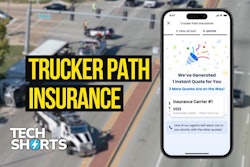Cargo theft costs motor carriers more than $520,000 annually, according to American Transportation Research Institute in a report released a couple weeks ago on the heels of a 60 Minutes episode that featured Food Network host Guy Fieri’s loss of over $1 million in the theft of two trailer loads with about 24,000 bottles of Santo Tequila.
According to the 60 Minutes report, Santo Spirits hired a legitimate trucking company to move the tequila, but that trucking company outsourced the loads to two other trucking companies that turned out to be fake.
It’s called strategic cargo theft or theft by deception, and it’s becoming much more common, Danny Ramon, director of intelligence and response for logistics visibility platform Overhaul, said during a recent National Motor Freight Traffic Association (NMFTA) webinar.
“It has really changed how freight is stolen in this world and how it's liquidated, as well as what can be targeted,” he said.
The top attack vectors in 2024 included identity theft (fraudsters impersonating legitimate carriers to gain access to broker loads); double brokering (illegitimate carrier transfers leading to non-payment and cargo loss); change in ownership (scammers buying old MCs from previously legitimate companies); and FMCSA contact manipulation (unauthorized email and phone changes used to hijack legitimate carrier accounts), according to Highway’s Freight Fraud Index, which said year-over-year fraudulent activity targeting freight brokers, carriers and shippers increased 27% in 2024.
That’s why the industry is fighting back with technology.
Physical theft
Electronic logging device provider ELD Mandate has rolled out three new technologies alongside its previously launched hidden GPS tail-light tracking device with embedded camera, EM200.
Altogether, the devices “basically build a mini fortress out of a regular, ordinary trailer,” said Ratan Baid, COO of ELD Mandate. “Every device is actually talking to each other, and every device has GPS tracking and the capability of Bluetooth and Wi-Fi.”
The taillight device’s camera helps drivers when backing up, but it also captures images when the trailer stops and starts, of loading and unloading and of rear crashes – all fed into the dash camera feature.
That device is now part of ELD Mandate’s full-spectrum trailer security suite, Trinetra Guard, which includes the EM4000 AI Camera System, EM6000 Auto, and the Smart Trailer Door Locker and aims to prevent cargo theft.
The camera system includes one camera at the nose of the trailer that captures images and video of the tractor and, using AI, detects the MC and DOT numbers on the truck and comparing the to the bill of lading to ensure the proper truck is attaching to the proper trailer. It also includes a camera inside the trailer that monitors the cargo, capturing loading and unloading, if the cargo is fastened properly for insurance purposes, and that helps identify unused cargo space for maximized revenue opportunities.
[RELATED: Cargo theft reaches record highs, costing businesses millions]
EM6000 Auto is an automated landing gear system that eliminates manual cranking and prevents unauthorized trailer movement. A smart lock is installed on the landing gear, and once a trailer is disconnected from the original truck, it automatically locks. When a new truck comes to connect to that trailer, a keypad must be used to unlock the landing gear. And for the drivers, there is an automatic lift feature that aims to eliminate related injuries.
The final feature is a Smart Trailer Door Locker, an electromechanical lock with remote access and a tamper-proof design. It can only be unlocked using a keypad.
Trinetra Guard uses AI to continuously verify trailer location against scheduled routes and alert fleet managers to any deviation.
“Trucking companies who own these trailers are going to be able to have a lot more cargo – at least 80% or 70% more than the ones with ordinary trailers because a shipper is definitely going to give the cargo to someone who has a secure trailer,” Baid said. “So, they're going to have much higher revenue and profits because of the high amount of cargo or loads. The drivers will love it because of the automatic lift. The insurance companies will also like this entire solution because they will have fewer claims.”
Baid said all of ELD Mandate’s solutions are registered and in compliance with the Federal Motor Carrier Safety Administration. The company previously white-labeled – meaning it did not develop the app itself but used another company’s product to evaluate its viability instead – the former ELD Mandate Plus device that has since been revoked by the FMCSA.
Cyber-enabled theft
Other organizations are also working to prevent cyber-enabled cargo theft.
Truckstop.com, for example, has two new partnerships to expand access to resources for its users.
[RELATED: New FMCSA initiatives help tackle escalating freight fraud]
Its partnership with the NMFTA makes resources accessible, free of charge, including cybersecurity guides, checklists, and best practices with a focus on small carriers and owner-operators who tend to be most vulnerable to cyberattacks and cargo crime. It is also working with freight fraud expert Dale Prax, founder of Collaborative Rating Systems, whose movement seeks to work with law enforcement and government agencies to identify solutions, advise the industry on adoption, and provide industry leaders with the insights they need to strengthen shared defenses.
“Carriers and logistics providers understand the issue of fraud. They feel it every day in their bones,” said Truckstop.com CEO Scott Moscrip. “What they need are real solutions that help them adjust to emerging risks, adopt countermeasures, and safeguard their livelihoods. And they need those things now.”











